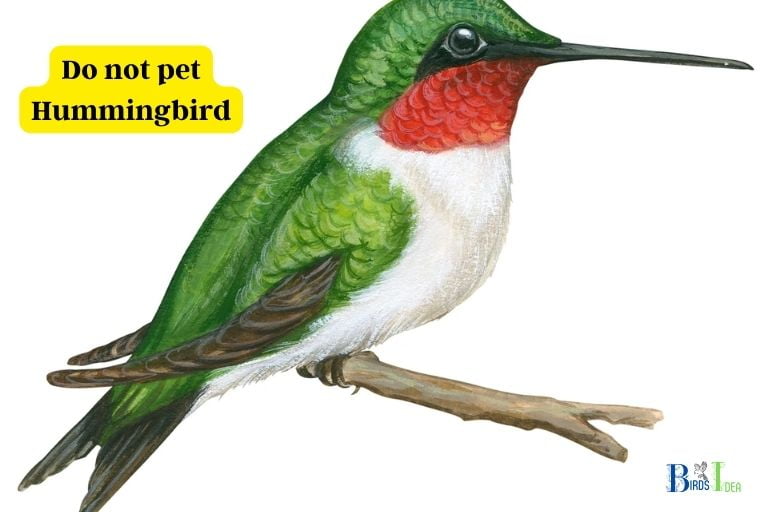Can You Have A Hummingbird As A Pet: NO, 5 Factors!
No, you cannot have a hummingbird as a pet.
It is illegal to own Hummingbirds in the United States, as the birds are protected under the Migratory Bird Act.
This act is meant to protect the birds from over-collection for the pet trade.
Four Reasons why you can’t have a Hummingbird as a pet:
Hummingbirds can often not survive in captivity due to the difficulty associated with providing the birds with a specialized diet and care, as well as depriving them of the chance to migrate.
For these reasons, it is illegal to keep a hummingbird as a pet.
5 Factors About Hummingbird As A Pet
| Factor | Explanation |
| Legality | In many places, it’s illegal to keep a hummingbird as a pet due to wildlife protection laws. |
| Hummingbird’s Needs | Hummingbirds require a specific diet and environment that can be difficult to recreate in a domestic setting. |
| Lifespan | The lifespan of a captive hummingbird may be significantly reduced compared to one in the wild. |
| Impact on Ecosystem | Removing hummingbirds from their natural habitat can have detrimental effects on local ecosystems. |
| Alternatives | Rather than keeping a hummingbird as a pet, people can set up feeders and plant flowers that attract hummingbirds to their yards. |
Key Takeaway

Five Facts About: Hummingbird As A Pet
DID YOU KNOW
Hummingbirds make up about 325 different species of birds found primarily in the Americas.
Why It’s Illegal to Own Hummingbirds as Pets
Hummingbirds are majestic creatures that have fascinated humans for centuries, but unfortunately, it is illegal to own them as pets in the United States.

There are several reasons why it is illegal to keep hummingbirds as pets, including the following:
- Hummingbirds are protected by the Migratory Bird Treaty Act of 1918, which states that any native species of bird cannot be kept in captivity without a permit.
- Hummingbirds are naturally wild creatures and often do not survive in captivity due to the lack of a proper habitat and diet.
- Hummingbirds are often taken from the wild illegally and then sold on the black market, often without proper care or knowledge of the bird’s needs.
Hummingbirds are incredibly sensitive creatures and require a delicate balance of food, sunlight, and humidity to survive.
Keeping a hummingbird as a pet, therefore, is not only illegal but also detrimental to the health of the bird. It is important to remember that even if a hummingbird is kept in an enclosure, it is still illegal and considered poaching.
If you are interested in observing hummingbirds, the best way to do so is to visit their natural habitats or participate in hummingbird banding and tracking programs.
Reason 1: Protection Under the Migratory Bird Act
The Migratory Bird Act provides protection for over 800 species of birds in the United States and Canada.
This federal law prohibits the possession of migratory birds, as well as their eggs, feathers, and nests, without a permit from the U.S. Fish and Wildlife Service.
The main goal of the Migratory Bird Act is to protect and conserve these species. It provides a legal framework to ensure their safety, as well as their habitats and migratory patterns.

This includes protecting birds from hunting and trapping, as well as from the destruction of their habitats, such as wetlands or forests.
The Act also bans the sale and trade of migratory birds, as well as their eggs, feathers, and nests.
This restricts the market in which birders, hunters, and trappers can obtain birds and their related items. This means that all birds are protected, regardless of their rarity or value.
The Migratory Bird Act is an important law that helps to ensure the safety of our nation’s bird species.
It protects them from harm, exploitation, and destruction of their habitats, ensuring that they remain abundant and healthy for future generations to enjoy.
Reason 2: Specialized Care Needs
There are a variety of reasons why people may need specialized care.
For example, a person may have a medical condition that requires special attention, or they may be at a stage of life where they need more specialized care due to physical or mental limitations.
Some people may need specialized care in order to best manage their particular health condition.

In these cases, specialized care can be a key factor in helping people to live healthier and more fulfilling life.
Some of the most common specialized care needs include:
- Physical therapy and rehabilitation
- Mental health care
- Specialized medical care
- In-home care
- End-of-life care
- Palliative care
- Social services
- Speech and language therapy
- Nutritional counseling
- Occupational therapy
- Specialized care for seniors and those with disabilities.
Reason 3: Necessity of Migration
Migration is a necessity for many people around the world who seek to improve their lives. It can provide the opportunity to access better education, employment, and living conditions.
Migration can also provide an escape from life-threatening circumstances such as political unrest, natural disasters, and economic decline.
For these reasons, migration is often a necessary step for individuals to realize their full potential.

For example, many people in the developing world move to industrialized countries to find employment and improve their financial situation.
Additionally, those from nations with oppressive regimes often find it necessary to move to countries where they can practice their religion and beliefs freely.
Finally, in many parts of the world, migration is necessary to access basic necessities such as clean water, food, and shelter.
Overall, migration is a necessary option for many people who are seeking to better their lives. It can provide access to resources that are otherwise inaccessible and can be the difference between a life of poverty and a life of prosperity.
Reason 4: Specific Diet Requirements
There are a variety of reasons why a person may choose to follow a specific diet. One key reason is health concerns.
A person may want to follow a diet for medical reasons and dietary restrictions such as allergies, intolerances, or specific health conditions.
For example, someone with diabetes may opt to follow a low-carb diet to help keep their blood glucose levels stable and healthy.

Other reasons a person may choose to stick to a specific diet include weight management, personal preference, religious beliefs, or cultural practices.
For example, someone may follow a vegan or vegetarian diet due to their beliefs or personal dietary preference.
Overall, there are a variety of reasons why a person may choose to follow a specific diet. From health concerns to religious beliefs, diet plays an important role in a person’s overall wellness and lifestyle.
“By protecting wild places and the animals that inhabit them, we are protecting ourselves.”
birdsidea
Is It Possible to Have a Pet Humingbird?
Yes, it is possible to have a pet hummingbird. Although it is not a common practice, with the right resources, equipment, and knowledge, one can care for a hummingbird as a pet.

To get started, here are some things to consider:
- The type of hummingbird: Different species have different habitats and behaviors, so it is important to research the specific breed of hummingbird that is desired to ensure that its needs can be adequately met.
- Housing: Hummingbirds require a secure, safe and well-ventilated cage or aviary to live in. It should be large enough for the bird to stretch its wings and move about.
- Nutrition: Hummingbirds require a specialized nectar diet that is specific to their species. Hummingbird foods can be purchased in pet stores or online. Supplementation with fruits, vegetables, and small insects can also be provided.
- Health Care: Hummingbirds need regular medical attention to ensure that they stay healthy, so taking them to the vet for regular checkups is important.
Overall, having a pet hummingbird can be a rewarding experience and a great way to learn more about these fascinating creatures.
With the right resources, equipment, and knowledge, it is possible to provide a safe and comfortable environment for a pet hummingbird.
What Are The Alternatives?
When it comes to making decisions, there are a variety of different approaches that one can take. Generally speaking, the three most popular alternatives are:
Analytical Decision-Making:
This approach involves collecting data, analyzing the data, and then making a decision that is based on the data.
For example, a business that is deciding whether or not to open up a new location might use analytical decision-making by collecting market research data and financial data to make an informed decision.
Intuitive Decision-Making:
This approach involves relying on one’s gut feeling and intuition when it comes to making decisions.
For example, when deciding whether or not to invest in a particular stock, an investor might use their intuition to form an opinion about the stock’s future potential.
Group Decision-Making:
This approach involves getting input from a group of people before making a decision. For example, when deciding on a company’s annual budget, a team of stakeholders might come together to figure out how to best allocate the funds.

Ultimately, the approach that is best for any given situation depends on the context and the specific decision that needs to be made.
Whether one opts for analytical decision-making, intuitive decision-making, or group decision-making, it is important to remember to weigh all of the options carefully before making a final decision.
What Should You Do if You Find an Injured Hummingbird?
If you find an injured hummingbird, there are several things you can do to help.
Here are some steps to take:
- Remain calm and gentle. Hummingbirds are sensitive to sudden movements and loud noises, so handle the bird as gently and quietly as possible.
- Place the bird in a small box, such as a shoebox. Make sure the box is ventilated, and put some tissues or a cloth on the bottom to create a soft surface. Put some air holes in the box lid and place the box in a warm, dark place.
- Contact a licensed wildlife rehabilitator or veterinarian. Do not attempt to care for the bird yourself. Licensed professionals are the right people to handle this type of situation.
- Do not attempt to feed or water the bird. Seek professional help for this as well.
By following these steps, you can help an injured hummingbird get back on its feet and return to the wild.
FAQ of Can You Have A Hummingbird As A Pet
Is it legal to keep a hummingbird as a pet?
In some cases, it may be possible to obtain a permit to keep a hummingbird in captivity, but only if the bird is being rehabilitated or if it is otherwise non-releasable.
Are hummingbirds easy to care for?
How can I attract hummingbirds to my garden?
Hummingbirds are also attracted to red and shiny objects, such as pieces of jewelry, ribbons, and foil-wrapped pieces of sugar cubes.
How long can hummingbirds live in captivity?
Is it cruel to keep a hummingbird as a pet?
Furthermore, hummingbirds have very specific and intricate diets which can be difficult to replicate in a domestic setting.
Conclusion
It is illegal to own a hummingbird as a pet in the United States due to the Migratory Bird Act, which is designed to protect the birds from over-collection in the pet trade.
In captivity, hummingbirds often cannot survive due to the specialized diet and care they require, as well as the need to migrate.






